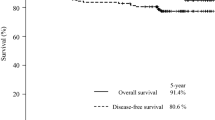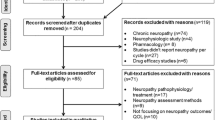Abstract
Background
Several oxaliplatin-specific scales have been proposed in clinical practice to evaluate oxaliplatin-related neurotoxicity. We investigated whether there might be a discrepancy between the National Cancer Institute Common Terminology Criteria for Adverse Events (NCI-CTCAE) and the Neurotoxicity Criteria of Debiopharm (DEB-NTC), the commonly used oxaliplatin-specific scales, in the evaluation of peripheral neurotoxicity.
Patients and methods
The subjects were 42 patients with metastatic colorectal cancer who received more than 6 cycles of first-line therapy with modified FOLFOX6 and more than 6 cycles of second-line therapy with FOLFIRI. The median number and cumulative dose of oxaliplatin administrations were 10.5 (range 6–22) and 889.4 mg/m2 (range 484.5–1875.0 mg/m2), respectively. The peripheral neurotoxicity was evaluated during mFOLFOX6 therapy and after its discontinuation using NCI-CTCAE ver. 3.0 and DEB-NTC. Data were collected prospectively and analyzed retrospectively.
Results
The concordance rate of the peripheral neurotoxicity grade determined by these criteria was low: 48.8% during mFOLFOX6 and 47.3% after discontinuation of therapy. The cumulative dose of oxaliplatin-related peripheral neurotoxicity in 50% of the patients was lower when evaluated by DEB-NTC for both grades 1 (P = 0.09) and 2 (P < 0.001). The cumulative rate of improvement from grade 2 to 1 (P < 0.001) and from grade 2 to 0 (P < 0.05) after discontinuation of mFOLFOX6 therapy was higher when NCI-CTCAE was used for the evaluation.
Conclusion
We found a discrepancy between the NCI-CTCAE and DEB-NTC scales in the evaluation of oxaliplatin-related neurotoxicity and suggest that the concomitant use of NCI-CTCAE and DEB-NTC would be useful to maintain oxaliplatin-based chemotherapy at higher quality.


Similar content being viewed by others
References
Goldberg RM, Sargent DJ, Morton RF et al (2004) A randomized controlled trial of fluorouracil plus leucovorin, irinotecan, and oxaliplatin combination in patients with previously untreated metastatic colorectal cancer. J Clin Oncol 22:23–30
de Gramont A, Figer A, Seymour M et al (2000) Leucovorin and fluorouracil with or without oxaliplatin as first-line treatment in advanced colorectal cancer. J Clin Oncol 18:2938–2947
André T, Boni C, Navarro M et al (2009) Improved overall survival with oxaliplatin, fluorouracil, and leucovorin as adjuvant treatment in stage II or III colon cancer in the MOSAC trial. J Clin Oncol 27:3109–3116
Stephanie RL, Jacek AK, Reena SC et al (2007) Neurotoxicity from oxaliplatin combined with weekly bolus fluorouracil and leucovorin as surgical adjuvant chemotherapy for stage II and III colon cancer: NSABP C-07. J Clin Oncol 25:2205–2211
Grothey A (2003) Oxaliplatin-safety profile: neurotoxicity. Semin Oncol 30:5–13
Cavaletti G, Tredici G, Petruccioli MG et al (2001) Effects of different schedules of oxaliplatin treatment on the peripheral nervous system of the rat. Eur J Cancer 37:2457–2463
Krishnan AV, Goldstein D, Friedlander M et al (2005) Oxaliplatin-induced neurotoxicity and the development of neuropathy. Muscle Nerve 32:51–60
Grothey A (2005) Clinical management of oxaliplatin-associated neurotoxicity. Clin Colorectal Cancer 5(Suppl 1):S38–S46
Meyerhardt JA, Mayer RJ (2005) Systemic therapy for colorectal cancer. N Engl J Med 352:476–487
Gamelin E, Gamelin L, Bossi L et al (2002) Clinical aspects and molecular basis of oxaliplatin neurotoxicity: current management and development of preventive measures. Semin Oncol 29(5 Suppl 15):21–33
Choi J, Kong K, Mozaffar T et al (2006) Delayed oxaliplatin associated neurotoxicity following adjuvant chemotherapy for stage III colon cancer. Anti-cancer Drugs 17:103–105
Imada H, Kwakami K, Hiraoka T et al (2007) Drug information brochure for patients undergoing FOLFOX4 chemotherapy based on survey of adverse reaction. Peripheral neurotoxicity. J Cancer Chemother 34(9):1425–1430
Shouji D, Matsusaka S, Watanabe C et al (2008) Relative dose intensity of FOLFOX4 regimen. Jperipheral neurotoxicity. J Cancer Chemother 35(11):1895–1900
Gamelin L, Boisdron-Celle M, Delva R et al (2004) Prevention of oxaliplatin-related neurotoxicity by calcium and magnesium infusions: a retrospective study of 161 patients receiving oxaliplatin combined with 5-fluorouracil and leucovorin for advanced colorectal cancer. Clin Cancer Res 10:4055–4061
Cascinu S, Catalano V, Cordella L et al (2002) Neuroprotective effect of reduced glutathione on oxaliplatin-based chemotherapy in advanced colorectal cancer: a randomized, double-blind, placebo-controlled trial. J Clin Oncol 20(16):3478–3483
Wilson RH, Lehky T, Thomas RR et al (2002) Acute oxaliplatin-induced peripheral nerve hyperexcitability. J Clin Oncol 20:1767–1774
Tournigand C, Cervantes A, Figer A et al (2006) OPTMOX1: A randomized study of FOFOX4 or FOLFOX7 with oxaliplatin in a stop-and-go fashion in advanced colorectal cancer—a GERCOR study. J Clin Oncol 24:394–400
Tournigand C, André T, Achille E et al (2004) FOLFIRI followed by FOLFOX6 or the reverse sequence in advanced colorectal cancer: a randomized GERCOR study. J Clin Oncol 22:229–237
Maindrault-Grobel F, Tournigand C, André T et al (2004) Oxaliplatin reintroduction in patients previously treated with leucovorin, fluorouracil, and oxaliplatin for metastatic colorectal cancer. Ann Oncol 15:1210–1214
National Cancer Institute. National Cancer Institute Common Toxicity Criteria version 3.0. http://ctep.cancer.gov/
Boku N, Ohtsu A, Hyodo I et al (2007) Phase II study of oxaliplatin in Japanese patients with metastatic colorectal cancer refractory to fluoropyrimidines. Jpn J Clin Oncol 37:440–445
Christian L et al (2002) Prevention of oxaliplatin-induced peripheral sensory neuropathy by carbamazepine in patients with advanced colorectal cancer. Clin Colorectal Cancer 2:54–58
Lévi F, Perpoint B, Garufi C et al (1993) Oxaliplatin activity against metastatic colorectal cancer. A phase II study of 5-day continuous venous infusion at circadian rhythm modulated rate. Eur J Cancer 29:1280–1284
Allegra CJ, Yothers G, O’Connell MJ et al (2011) Phase III trial assessing bevacizumab in sages II and III carcinoma of the colon: results of NSABP protocol C-08. J Clin Oncol 29:1–4
Ishibashi K et al (2010) Effect of calcium and magnesium on neurotoxicity and blood platinum concentration in patients receiving mFOLFOX6 therapy: a prospective randomized study. Int J Clin Oncol 15:82–87
Therasse P, Arbuck SG, Eisenhauer EA et al (2000) New guidelines to evaluate the response to treatment in solid tumors. J Natl Cancer Inst 92:205–216
Landis LR, Koch GG (1977) The measurement of observer agreement for categorical data. Biometrics 33:159–174
Caussanel JP, Lévi F, Brienza S et al (1990) Phase I trial of 5-day continuous venous infusion of oxaliplatin at circadian rhythm modulated rate compared with constant rate. J Natl Cancer Inst 82:1046–1050
Nikcevich DA, Grothey A, Sloan JA et al (2008) Effect of intravenous calcium and magnesium (IV CaMg) on oxaliplatin-induced sensory neurotoxicity (sNT) in adjuvant colon cancer: results of the phase III placebo-controlled, double-blind NCCTG trial N04C7. Proc Am Soc Clin Oncol 26 (abstr 4009)
Stephens RJ, Hopwood P, Girling DJ et al (1997) Randomized trials with quality of life endpoints: are doctors’ ratings of patients’ physical symptoms interchangeable with patients’ self-ratings? Qual Life Res 6:225–236
Conflict of interest
No author has any conflict of interest.
Author information
Authors and Affiliations
Corresponding author
About this article
Cite this article
Inoue, N., Ishida, H., Sano, M. et al. Discrepancy between the NCI-CTCAE and DEB-NTC scales in the evaluation of oxaliplatin-related neurotoxicity in patients with metastatic colorectal cancer. Int J Clin Oncol 17, 341–347 (2012). https://doi.org/10.1007/s10147-011-0298-z
Received:
Accepted:
Published:
Issue Date:
DOI: https://doi.org/10.1007/s10147-011-0298-z




